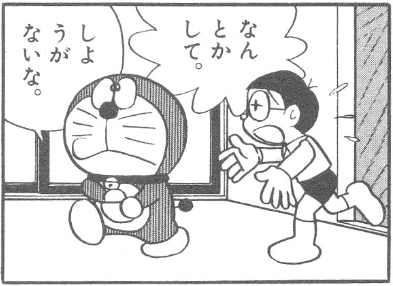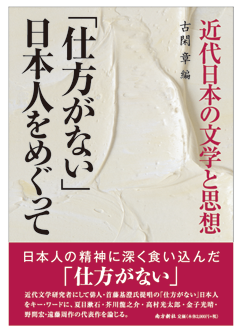しょうがない (shou ga nai) Meaning Japanese Grammar - It Can't Be Helped
Anna Baffa Volpe
Get in touch with meThe expression しょうがない (shou ga nai) can be translated as it can't be helped, there is no way or there is no method.
しょうがない is the colloquial and informal expression of 仕方がない.
It is worthy to know it, because it is an expression of common use in the Japanese language.
How to form しょうがない
パソコンを使いすぎて、このごろ目が疲れてしかたがない。
I used my computer too often so my eyes have been so tired lately.
As you can see, the expression しかたがない is not translated, but the concept is that because of the assiduous use of the PC, my eyesight has become fatigued and I can't do anything about it.
When we use しょうがない
しょうがない or is used for unpleasant things that sadden or annoy us; things that usually depend on external causes and for which we can do nothing.
Here are some situations we can use しょうがない:
- when we are in a hurry and we are in line at the supermarket, we cannot do anything but wait;
- when we have planned a beautiful trip to the beach, but a sudden thunderstorm has come, so we have to abandon our plan.
We can't use しょうがない for very serious things of our own or other people, only for fairly light things in our daily lives.
妹に頼まれた論文をしょうがなく手伝う。
I reluctantly help my sister with the paper she asked me to.
As we see in this sentence, the subject does not feel like doing the action, but the situation is such that he cannot refuse to do it, he has to do it somehow.
The expression has been used in its adverbial function: しょうがなく + Verb.
An appropriate adjective that translates the expression しょうがない could be inevitable.

のび太
なんとかして。
Do something about it!
ドラエモン
しょうがないな。
It can't be helped...
Other ways to translate the expression:
- There's nothing I can do
- I have no choice
- That's life
しょうがない and the Japanese approach to Life
しょうがない is recently considered one of the Japanese motivational phrases together with 生き甲斐 Ikigai the reason of being or 我慢 Gaman persevere and be patient.
It expresses very well the spirit of the Japanese people, the positive attitude even towards situations that are normally considered negative.
The expression itself is negative, but its nuance is positive: it teaches us not to make importance of things that do not depend on us, to observe them and let them go.

Difference between しょうがない and 仕方がない
しょうがない is considered more colloquial and informal, while 仕方がない is used in a more formal context.
We can hear a more formal expression using the verb ある in its polite negative form ありません, that is 仕方がありません.
必要なものなので、値段が少し高くても仕方がありません。
It's a necessary item, so I don't mind if the price is a bit high.
In an informal and colloquial context the particle が of 仕方がない is omitted.
A verse from a Japanese song of the Nineties:

でも逢いたい。逢いたくてしかたない。
But I want to see you. I can't help but want to see you.
しょうがない to express bodily sensations
しょうがない is often use when we can't control or suppress certain emotions or bodily sensations.
今日は頭が痛くてしょうがない。
My head hurts so much today.
今日は寒くてしょうがない。
It's too cold today.
As we see in the previous sentences, we do not need to literally translate the expression, we can emphasize the feeling or sensation expressed by using adverbs such as very, extremely, too, so.
朝ごはんを食べたら眠くてしかたがない。
After eating breakfast, I feel incredibly sleepy.
しょうがない referred to other people
When we want to express how a third party feels, we have to use ようだ, そうだ, らしい it seems that.
友人は勉強が嫌いでしょうがないようだ。
My friend seems to be really struggling with studying.
しょうがない speaking of feelings and sensations
しょうがない is often used when we talk about 感情 feelings, emotions and 感覚 sensations and we can find the adjectives:
- 悲しい
sad,unhappy - 辛い
difficult,painful - 不安な
worried,anxious - 残念な
regrettable,unfortunate - 嫌な
unpleasant
or verbs and expressions about sensations such as:
- 疲れる
get tired - 痛い
painful - 眠い
sleepy - 腹が減る
become hungry
この先どうなってしまうのか。不安でしょうがないです。
I'm so anxious about what will happen in the future.
しょうがない can also be used with adjective or expressions of positive meaning, emphasizing the emotion.
プレゼントをもらって、嬉しくてしょうがない。
I'm very happy to receive this gift!
孫がかわいくてしょうがない。
My grandchild is so adorable I can't help it.
Examples of しょうがない
Use of しょうがない in a positive way, the subject expresses a strong desire:
冷たいものを飲みたくてしょうがない
I really want to drink something cold.
Use in situation considered negative: I can't help but
子供たちがわがままばかり言うので、腹が立ってしょうがない。
I can't help but get angry because my children are so selfish.
Another example talking about a negative situation: If it can't be helped
そんなに辛くてしょうがないのなら、会社をやめてもいいと思うよ。
If it's that hard and you can't help it, I think you can quit your job.
Similar grammar points in Japanese 📚
申し訳ございません
申し訳ございません (moshi wake gozaimasen) Meaning Japanese Grammar - I Apologize
わけがない
わけがない (wake ga nai) Meaning Japanese Grammar - There Is No Reason That
わけではない
わけではない (wake dewa nai) Meaning Japanese Grammar - Does Not Mean That
わけだ
わけだ (wake da) Meaning Japanese Grammar - That's Why...
わけがある
わけがある (wake ga aru) Meaning Japanese Grammar - There Is a Reason If
わけが分からない
わけが分からない (wake ga wakaranai) Meaning Japanese Grammar - Absurd